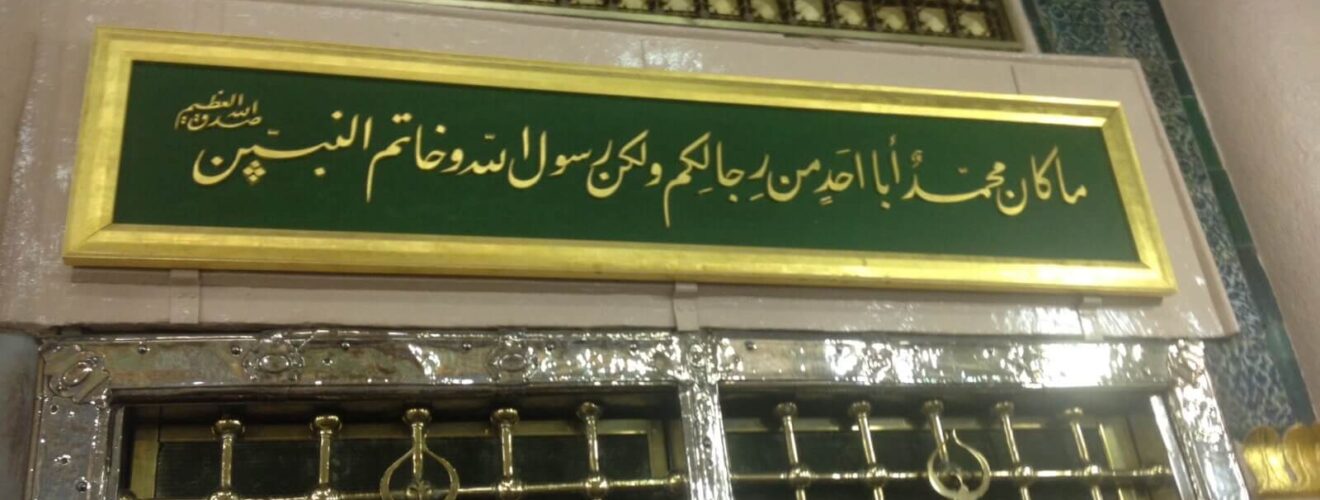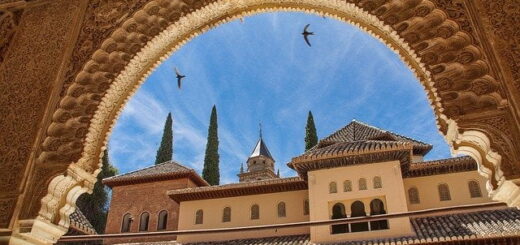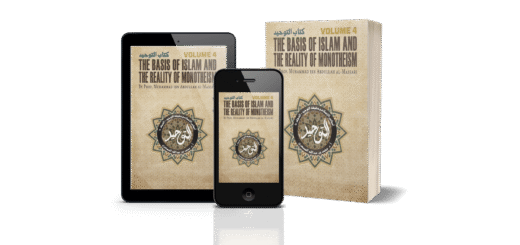‘Don’t make my grave an idol’

Getting your Trinity Audio player ready...
|
Previously we have briefly touched upon the most common arguments dominating discourse surrounding the root origins of Shirk (polytheism). Often, this discourse centres around three distinct poles: the story of al-Lāt, the idols worshipped by the people of Noah (peace be upon him), and the narration which states: ‘O Allah do not make my grave a wathn’ (idol).’
The present piece addresses the last of these poles. For this, we provide a translation from the book entitled ‘The Binding Prohibition Against Taking Graves as Mosques,’ by Professor Muḥammad al-Massari. At this juncture, we haven’t undertaken a complete translation of the book. Rather, we have limited the present translation to cover the specific issue of this narration.
By way of a preamble and short introduction, the first section is taken from the opening chapter of the book, a translated summation to provide greater context for the matter being discussed. Chapter five properly begins with the discussion centered on the narration ‘O Allah do not make my grave a wathn’ as it is found in the corpus of aḥādith.
The takhrij (sourcing) for this narration is discussed in detail together with a detailed analysis regarding its origin and authenticity. Admittedly, takhrij in addition to analysing hidden defects within traditions is not within the domain of everyone. Specialist works are devoted to this, with high-calibre scholars producing detailed works. Such matters are not always at the forefront of minds when a matter such as this is put to serious discussion. Although the modern era has inexorably slid into the echo chamber of rhetorical soundbites, this Deen is not built upon such shaky foundations.
Separately, an exhaustive study on the nature of Aṣnām and Awthān (idols) together with the beliefs of the pre-Islamic Arabs is to be covered in the forthcoming English translation of Volume 2 of Kitāb al-Tawḥeed by Professor al-Massari.
وحدثني قتيبة بن سعيد حدثنا الفزاري عن عبيد الله بن الاصم حدثنا يزيد بن الاصم عن ابي هريرة ان رسول الله صلى الله عليه وسلم قال لعن الله اليهود والنصارى، اتخذوا قبور انبيائهم مساجد
Qutayba ibn Sa’eed narrated to me al-Fazāri narrated to us from ‘Ubaydallah ibn al-Aṣam, Yazeed ibn al-Aṣam narrated to us from Abu Hurayrah that the Messenger of Allah, peace and blessings be upon him said:
May Allah curse the Jews and the Christians because they took the graves of their Prophets as mosques.
[Ṣaḥīḥ Muslim]
Preamble
Taking the graves, especially those belonging to the Prophets, the Ṣāliḥeen (righteous Muslims) as masājid (pl. of masjid / mosque) is concerned to be a major matter that is prohibited in Islam. It is an act deserving curse, dispraise and it is a matter taking one away from the mercy of Allah. Those doing this, are considered to be performing an action that is reprehensible in the sight of Allah. The masjid is the place of sujud (prostration), which is part of the designated form of our Ṣalāh. Essentially there is no difference between a building that is formally constructed, even decorated, as is the case with most masājid today, and one that is designated or distinguished as such, with specified boundaries, even if not fully built. The Prophet, peace and blessings be upon him confirmed that the entire earth has been made a masjid and Ṭahur (ritually clean), one of the bounties given for his Prophetic mission, a matter not bestowed on previous Prophets. Masājid can be either a permanent construct or one that is temporary.
The taking of graves as masājid is a matter arising from sin and evil, as is making it a place of Eid, where people gather in a similar manner to the celebrations of Eid. By engaging in such acts or any part of them, it may give the appearance that the grave is being turned into a wathn’ (idol), something symbolising Kufr (disbelief) and Shirk (polytheism), a matter that was feared by the Amir al-Mu’mineen, Umar ibn al-Khaṭṭāb (may Allah be pleased with him) as we will discern from his statement.
Idols
The Awthān (pl. of wathn’, idol), can be sub-divided into several categories. This is but a general overview as one shouldn’t take the beliefs of the mushrikeen (polytheists) as always being clear or even free from inherent contradiction.
- Category 1: Aṣnām (pl. of Ṣanam, idol)
These are carved (or engraved) images, Tamātheel (pl. timthāl, sculptures, statuettes). They come in various forms, being made or carved from stone like baetyls, wood, metal, or otherwise, such as directly depicting humans, animals or imagined composite beings. For example, some have the head of an animal, but the body of a woman, or vice versa. Others combine different animals, like winged horses (Pegasus). Every Ṣanam is a wathn’, but not every wathn’ is a Ṣanam. The Aṣnām in the mind of the mushrik, is closely associated with a ‘divine being’ that it is said to represent. This association can be construed at times as being a matter of ‘uniting’ with that, becoming one entity, or sharing a nature. It can also be seen as being a vessel or conduit for that ‘divine being’ to occupy in this temporal world. Some cultures view it as being dwelling place or permanent about for that supposed ‘divine being,’ like a soul or spirit attached to that physical entity. In the simple minds of the common mushrikeen, it may be very difficult to neatly decompartmentalise or even distinguish clearly between the supposed ‘divine being’ and that of the Ṣanam. The following Qur’anic verses should be studied very closely, beginning with what Allah says of the people of Ibrahim (Abraham) peace be upon him:
نَعْبُدُ أَصْنَاماً فَنَظَلُّ لَهَا عَاكِفِينَ
‘We worship idols, and are constantly in attendance on them.’[1]
إنما تعبدون من دون الله أوثاناً، وتخلقون إفكاً
What you worship instead of Allah are mere Awthān; what you invent is nothing but falsehood.[2]
For some among the Children of Israel, the ‘idea’ of a ṣanam and a deity was intertwined:
وَجَاوَزْنَا بِبَنِي إِسْرائيلَ الْبَحْرَ فَأَتَوْا عَلَى قَوْمٍ يَعْكُفُونَ عَلَى أَصْنَامٍ لَهُمْ قَالُوا يَا مُوسَى اجْعَلْ لَنَا إِلَهاً كَمَا لَهُمْ آلِهَةٌ قَالَ إِنَّكُمْ قَوْمٌ تَجْهَلُونَ
We took the Children of Israel across the sea, but when they came upon a people who worshipped idols, they said, ‘Moses, make a god for us like theirs.’ He said, ‘You really are foolish people.[3]
فَأَخْرَجَ لَهُمْ عِجْلاً جَسَداً لَهُ خُوَارٌ فَقَالُوا هَذَا إِلَهُكُمْ وَإِلَهُ مُوسَى فَنَسِيَ
But he [Samiri, used the molten jewellery to] produce an image of a calf which made a lowing sound, and they said, ‘This is your god and Moses’ god, but he has forgotten.’[4]
وقال: إنما اتخذتم من دون الله أوثاناً مودة بينكم في الحياة الدنيا، ثم يوم القيامة يكفر بعضكم ببعض، ويلعن بعضكم بعضاً، ومأواكم النار، وما لكم من ناصرين
Abraham said to them, ‘You have chosen Awthān instead of Allah but your love for them will only last for the present life: on the Day of Resurrection, you will disown and reject one another. Hell will be your home and no one will help you.’[5]
وَإِذْ قَالَ إِبْرَاهِيمُ رَبِّ اجْعَلْ هَذَا الْبَلَدَ آمِناً وَاجْنُبْنِي وَبَنِيَّ أَنْ نَعْبُدَ الْأَصْنَامَ
Remember when Abraham said, ‘Lord, make this town safe! Preserve me and my offspring from worshipping Aṣnām (idols).’[6]
- Category 2: General Awthān
Broadly, one could sub-divide this further for the sake of clarity:
- Aṣnām, in the sense that they can be considered as previously mentioned;
- Temples, which are dedicated to a specific ilah’ (deity), often accompanied by a veil and enclosure. Typically, they contain pictures or images of the Aṣnām, surrounding them being a restricted area or sanctuary.
- Sanctuary, a place considered forbidden, hallowed or a sacred space in general. This may not necessarily require or have a temple construct upon it. At times this is usually the preserve of those who believe in the divine or sacred status of objects, like trees, rocks, ravines or the like. The objects themselves could be believed to contain specific spiritual or even supernatural qualities by the adherents or devotees.
- Anṣāb (stone altars). These are structures of stone, sometimes depictions of non-living beings. Often erected with pillars, or standalone columns. Usually, they are utilised for blood sacrifices, offerings or the like. Mention is made of them within the Qur’ānic text.[7] They may not necessarily have a ṣanam present, but they are often distinguished by specific markings, engravings or symbols.
- Festive grounds. These can be areas or pieces of land that are without temples, but where pagan celebrations or festivities are held. Usually, they are associated with specific times, like the solstice, or arising from practices associated with the veneration of Aṣnām. One should note that this is not an exhaustive list.
- The wathn’ can also be from an object that is naturally occurring, not arising from human craftwork. The claim often advanced is that ‘a deity’ sat on it, was born from it, entered it or merged with it etc. Similar is witnessed in the pre-Islamic era from the tribe of Thaqeef al-Ṭā’if, which originally was the baetyl that was called al-Lāt.
- The concept of ‘tree goddesses’ is not one that is uncommon in cultures of the mushrikeen in history across the globe. These at times can be considered sacred spaces, cordoned off with curtains or veils or other special symbolism. In the pre-Islamic era, between al-Ṭā’if and Mecca, there was a palm-tree adorned with such paraphernalia, named al-‘Uzza.
Hence the word, wathn’ (idol) generally, refers to all symbols of Shirk or Kufr be they from the likes of the Aṣnām (idols), Anṣāb (stone alters), baetyls, trees, crosses, flags, shrines of the Ṭāghut, their temples, festivals etc, whether it is worshipped or otherwise. It is, in any event, an abomination that must be avoided, as Allah the Mighty and Sublime says:
فَاجْتَنِبُوا الرِّجْسَ مِنَ الأَوْثَانِ وَاجْتَنِبُوا قَوْلَ الزُّورِ
حُنَفَآءَ لِلَّهِ غَيۡرَ مُشۡرِكِينَ بِهِۦۚ
Shun the filth of idolatrous beliefs and practices and shun false utterances. Devote yourselves to Allah and assign Him no partners. [8]
[To continue reading, download here
Endnotes
[1] Qur’ān, 26: 71. The collection of verses (69/71) when read together are: Tell them the story of Abraham, when he asked his father and his people, ‘What do you worship?’ They said, ‘We worship idols, and are constantly in attendance on them.’
[2] Qur’ān, 29: 17
[3] Qur’ān, 7: 138
[4] Qur’ān, 20: 88
[5] Qur’ān, 29: 25
[6] Qur’ān, 14: 35
[7] Qur’ān 5: 3, ‘Anything sacrificed on stone altars.’
[8] Qur’ān, 22: 30/31



